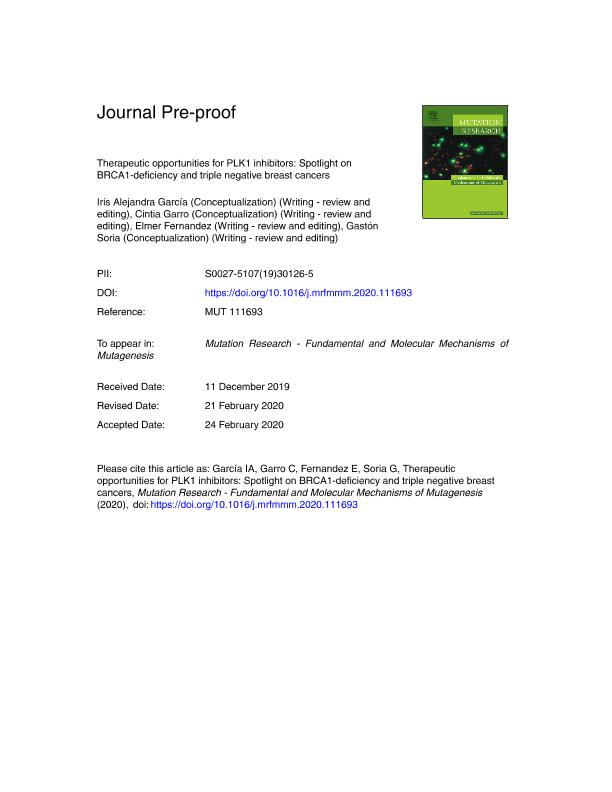Mostrar el registro sencillo del ítem
dc.contributor.author
García, Iris Alejandra

dc.contributor.author
Garro, Cintia Araceli

dc.contributor.author
Fernandez, Elmer Andres

dc.contributor.author
Soria, Gastón

dc.date.available
2021-09-09T15:37:29Z
dc.date.issued
2020-05
dc.identifier.citation
García, Iris Alejandra; Garro, Cintia Araceli; Fernandez, Elmer Andres; Soria, Gastón; Therapeutic opportunities for PLK1 inhibitors: Spotlight on BRCA1-deficiency and triple negative breast cancers; Elsevier Science; Mutation Research-fundamental And Molecular Mechanisms Of Mutagenesis; 821; 111693; 5-2020; 1-8
dc.identifier.issn
0027-5107
dc.identifier.uri
http://hdl.handle.net/11336/140005
dc.description.abstract
Polo-Like Kinases (PLKs) are central players of mitotic progression in Eukaryotes. Given the intimate relationship between cell cycle progression and cancer development, PLKs in general and PLK1 in particular have been thoroughly studied as biomarkers and potential therapeutic targets in oncology. The oncogenic properties of PLK1 overexpression across different types of human cancers are attributed to its roles in promoting mitotic entry, centrosome maturation, spindle assembly and cytokinesis. While several academic labs and pharmaceutical companies were able to develop potent and selective inhibitors of PLK1 (PLK1i) for preclinical research, such compounds have reached only limited success in clinical trials despite their great pharmacokinetics. Even though this could be attributed to multiple causes, the housekeeping roles of PLK1 in both normal and cancer cells are most likely the main reason for clinical trials failure and withdraw due to toxicities issues. Therefore, great efforts are being invested to position PLK1i in the treatment of specific types of cancers with revised dosages schemes. In this mini review we focus on two potential niches for PLK1i that are supported by recent evidence: triple negative breast cancers (TNBCs) and BRCA1-deficient cancers. On the one hand, we recollect several lines of strong evidence indicating that TNBCs are among the cancers with highest PLK1 expression and sensitivity to PLK1i. These findings are encouraging because of the limited therapeutics options available for TNBC patients, which rely mainly on classic chemotherapy. On the other hand, we discuss recent evidence that unveils synthetic lethality induction by PLK1 inhibition in BRCA1-deficient cancers cells. This previously unforeseen therapeutic link between PLK1 and BRCA1 is promising because it defines novel therapeutic opportunities for PLK1i not only for breast cancer (i.e. TNBCs with BRCA1 deficiencies), but also for other types of cancers with BRCA1-deficiencies, such as pancreatic and prostate cancers.
dc.format
application/pdf
dc.language.iso
eng
dc.publisher
Elsevier Science

dc.rights
info:eu-repo/semantics/openAccess
dc.rights.uri
https://creativecommons.org/licenses/by-nc-sa/2.5/ar/
dc.subject
BRCA-DEFICIENCY
dc.subject
BRCA1
dc.subject
BREAST CANCER
dc.subject
PLK1
dc.subject
TNBC
dc.subject.classification
Bioquímica y Biología Molecular

dc.subject.classification
Ciencias Biológicas

dc.subject.classification
CIENCIAS NATURALES Y EXACTAS

dc.title
Therapeutic opportunities for PLK1 inhibitors: Spotlight on BRCA1-deficiency and triple negative breast cancers
dc.type
info:eu-repo/semantics/article
dc.type
info:ar-repo/semantics/artículo
dc.type
info:eu-repo/semantics/publishedVersion
dc.date.updated
2021-04-28T21:57:55Z
dc.journal.volume
821
dc.journal.number
111693
dc.journal.pagination
1-8
dc.journal.pais
Países Bajos

dc.journal.ciudad
Amsterdam
dc.description.fil
Fil: García, Iris Alejandra. Consejo Nacional de Investigaciones Científicas y Técnicas. Centro de Investigación y Desarrollo en Inmunología y Enfermedades Infecciosas. Universidad Católica de Córdoba. Centro de Investigación y Desarrollo en Inmunología y Enfermedades Infecciosas; Argentina. Universidad Nacional de Córdoba. Facultad de Ciencias Químicas. Departamento de Bioquímica Clínica; Argentina
dc.description.fil
Fil: Garro, Cintia Araceli. Universidad Nacional de Córdoba. Facultad de Ciencias Químicas. Departamento de Bioquímica Clínica; Argentina. Consejo Nacional de Investigaciones Científicas y Técnicas. Centro Científico Tecnológico Córdoba. Centro de Investigaciones en Bioquímica Clínica e Inmunología; Argentina
dc.description.fil
Fil: Fernandez, Elmer Andres. Consejo Nacional de Investigaciones Científicas y Técnicas. Centro de Investigación y Desarrollo en Inmunología y Enfermedades Infecciosas. Universidad Católica de Córdoba. Centro de Investigación y Desarrollo en Inmunología y Enfermedades Infecciosas; Argentina
dc.description.fil
Fil: Soria, Gastón. Universidad Nacional de Córdoba. Facultad de Ciencias Químicas. Departamento de Bioquímica Clínica; Argentina. Consejo Nacional de Investigaciones Científicas y Técnicas. Centro Científico Tecnológico Córdoba. Centro de Investigaciones en Bioquímica Clínica e Inmunología; Argentina
dc.journal.title
Mutation Research-fundamental And Molecular Mechanisms Of Mutagenesis

dc.relation.alternativeid
info:eu-repo/semantics/altIdentifier/url/https://www.sciencedirect.com/science/article/abs/pii/S0027510719301265
dc.relation.alternativeid
info:eu-repo/semantics/altIdentifier/doi/http://dx.doi.org/10.1016/j.mrfmmm.2020.111693
Archivos asociados
